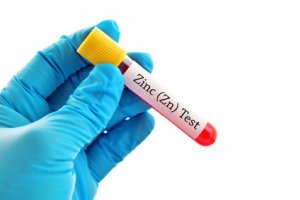Even minor zinc deficiencies may harm your digestion and health
 According to a new study that is published in the British Journal of Nutrition, even minor zinc deficiencies may cause poor digestion, skin problems, and fatigue - and lead to numerous other health problems in the long run. You should therefore avoid zinc shortages, and people with poor diets, vegans, vegetarians, and older people should make sure to get enough zinc.
According to a new study that is published in the British Journal of Nutrition, even minor zinc deficiencies may cause poor digestion, skin problems, and fatigue - and lead to numerous other health problems in the long run. You should therefore avoid zinc shortages, and people with poor diets, vegans, vegetarians, and older people should make sure to get enough zinc.
There are around 300 different enzymes in the body that need zinc to function properly. These enzymes control our metabolism, reproduction, nervous system, immune system, and numerous other functions. A team of researchers from the Technical University of Munich (TUM) have discovered that even minor zinc deficiencies are able to harm the digestive system in a short period of time, and that may interfere with other functions in the body.
A zinc deficiency can occur suddenly
The German study was headed by Daniel Brugger, and he has managed to create an entirely new view on zinc by comparing animals with clinical zinc deficiency with animals who have deficiencies and animals who have sufficient levels of this trace element in the body. Brugger explains that clinical zinc deficiencies are very rare - in animals as well as in humans. However, short-term or subclinical zinc deficiency seems to be a lot more common than previously thought, and this problem should be addressed.
In the mentioned study, Brugger studied animals with short-term or subclinical zinc deficiencies. Because zinc is a trace element which we humans only need in microscopic (trace) amounts from our diet, Brugger was able to induce clinical zinc deficiency in piglets after 10 days only.
How the metabolism responds to in increasing zinc deficiency
To begin with, a zinc deficiency does not produce any visible or noticeable symptoms, yet the researchers did observe minor changes in the liver and blood. For this reason they used piglets that had just been weaned. Afterwards, the piglets were given feed that contained smaller or greater quantities of zinc as a way of inducing a zinc deficiency at an early stage. The scientist explain that this was the only way they could analyze exactly how decreasing zinc stores affected the animals' metabolism.
First of all, the researchers observed that the piglets' absorption of zinc from their food was increasingly effective. Secondly, the pancreas secreted less zinc. According to the researchers, this may directly affect the digestion and the appetite of the animals, because undigested food accumulates in the intestines.
Why do we need zinc for our digestion and metabolism?
To help our digestive system digest food the pancreas releases various enzymes. Also, it
delivers zinc to the digestive tract to support numerous enzymatic processes. If, however, the body lacks zinc, the pancreases limits it zinc release to a minimum. According to Brugger, this affects the digestion and energy turnover to begin with.
Because digestion and energy turnover are particularly important for livestock during the growth period, and because zinc plays such an important role, this is a factor that farmers should pay special attention to. Humans should also make sure to get enough zinc.
Zinc deficiencies are common among different population groups
Brugger says that animals respond to a zinc deficiency in pretty much the same way as humans. He specifically recommends that vegans and vegetarians have their zinc levels measured, because we humans are better able to absorb zinc from animal food sources. Also, older people should have their levels determined, as older people generally have difficulty with absorbing zinc, so even if their diet contains enough of the nutrient, deficiencies may occur.
Not only can a zinc deficiency lead to poor digestion, reduced energy turnover, fatigue, and skin problems. It is also associated with impaired immunity, fertility issues, increased risk of inflammation, and several signs of ageing.
Common causes of zinc deficiencyUnbalanced diets, lack of animal protein in the diet, large calcium consumption, old age, alcohol, celiac disease (gluten intolerance), diarrhea, diuretics, birth control pills, and prolonged use of antibiotics. |
Older people, zinc deficiencies, and ageing signs
Older people generally have difficulty with absorbing zinc. Eating a poor diet and using diuretics increases the risk of a zinc deficiency, which may lead to several signs of ageing.
Did you know that Zinc levels in the blood of patients with Alzheimer's disease and Parkinson's disease are lower?
References:
Daniel Brugger et al. Subclinical zinc deficiency impairs pancreatic digestive enzyme activity and digestive capacity of weaned pigs. British Journal of Nutrition 2016
https://www.sciencedaily.com/releases/2016/06/160609115127.htm
Institute of Food Technologist (ITF). Eight ways zinc affects the human body. ScienceDaily 2014
https://www.sciencedaily.com/releases/2014/07/140718114541.htm
Search for more information...
- Created on .








